300-Yr-Outdated Cash Probably Used for Playing Discovered at Scottish Highlands Web site

Within the seventeenth Century Scottish Highlands, card video games, cube video games, and even betting on horses gained in reputation as types of playing leisure. Over 300 years later, archeologists in Scotland could have discovered a number of the cash that had been used within the video games.
A pot and 36 silver and bronze cash within the former home of Highland clan chief Alasdair Ruadh ‘MacIain’ MacDonald of Glencoe. The discover was uncovered by the College of Glasgow at a dig within the Scottish Highlands. (Picture: The College of Glasgow)
The College of Glasgow stated in a press release that it discovered a pot containing 36 cash throughout a dig at a home in Glencoe within the Scottish Highlands. They had been buried, presumably deliberately, beneath a hearth in a home that when belonged to Alasdair Ruadh “MacIain” MacDonald of Glencoe, who dominated the MacDonald clan from 1646 to 1692.
Archeologists decided that the entire cash predated 1690. That is an impactful clue, because the clan was massacred in a shock assault in 1692.
Scots Embraced Playing as Leisure
There’s proof the Scots of the time performed numerous sorts of card video games that included playing. One was presumably Bawbee Nap, a trick-taking sport generally performed within the UK, and a variation of the equally named card sport Nap.
In Bawbee Nap, gamers bid on the variety of tips they count on to take throughout a spherical. The sport includes parts of technique and bluffing, and gamers earn factors based mostly on the variety of tips they win in comparison with their bid. Bawbee was the outdated Scottish halfpenny that was in circulation from the late sixteenth century to the mid-18th century.
The standard Highland Video games featured quite a lot of bodily contests, similar to caber tossing, tug-of-war, and the stone put. Spectators and members alike would place bets on the opponents, including an additional layer of competitors and leisure to the video games.
Shinty, a stick and ball sport just like right this moment’s discipline hockey, was immensely fashionable within the Highlands. Highlanders typically engaged in betting on the outcomes of shinty matches. Bets might embody predicting the profitable workforce, the variety of objectives scored, or different facets of the sport.
The Highlands had its personal set of conventional betting customs, typically tied to native occasions, festivals, or gatherings. Betting on races, challenges, or different competitions that passed off throughout these occasions was commonplace.
Bloodbath Writes the Historical past Books
The Glencoe Bloodbath of 1692, as it could come to be identified, was a darkish episode in Scottish historical past that unfolded within the aftermath of the Wonderful Revolution of 1688. The bloodbath passed off within the Glen Coe area of the Scottish Highlands, the place members of the MacDonald clan confronted betrayal and violence.
On the coronary heart of the bloodbath was a posh political scenario. In 1688, King James II of England was overthrown through the Wonderful Revolution, resulting in the ascent of William of Orange to the throne. The MacDonalds, like many Highland clans, had been loyal to James.
In 1691, an oath of allegiance was required, compelling clans to swear loyalty to William and Mary by January 1, 1692. Clan Chief Alexander MacDonald, often known as MacIan, delayed taking the oath due to harsh winter circumstances and confusion about the place it might be sworn.
Sir John Dalrymple, Grasp of Stair and Secretary of State for Scotland, noticed a possibility to suppress perceived Jacobite sympathizers and assert management over the Highlands. He ordered troops, beneath the command of Captain Robert Campbell, to hold out an assault in what would turn into often known as the 1692 Bloodbath of Glencoe.
On the evening of Feb. 13, 1692, the troopers, who had been quartered with the MacDonalds for almost two weeks, turned towards their hosts. The bloodbath resulted within the deaths of at the least 38 members of the MacDonald clan and the creation of a everlasting chapter in Scottish historical past.





